They arrive with the start of the summer season: finally old enough for adult responsibilities, still young enough to get paid like children for them. They’re pale from months of fluorescent classroom hibernation, eager to put biology credits toward the art of beach bronzing, sociology lessons toward the science of swimmer surveillance. They’re vigilant, trusted, and fun, just as satisfied with as they are sick of the sand and saltwater crunch that becomes the scourge of hairdressers and shower drains around the Island.
They’re the South Beach lifeguards, and they’re ready for the summer of their lives.
But first things first, they have to be on time.
“Everyone’s in here by 9 o’clock,” said twenty-two-year-old head lifeguard Brian Jordan. “I bring them out – 9:01 they’re on the beach, 9:02 they’re out there swimming. And we swim the whole beach.”
The South Beach lifeguards patrol the legendary mile-long stretch of Katama coastline that extends all the way from Right Fork to, well, Left Fork on Edgartown’s southeastern prow. Divided into five watch stations, the beach plays host to an eclectic mix of frat boys, families, retirees, and celebrities. Everyone from Spike Lee to that old lady who claims she used to look like Vivien Leigh has graced its banks, making it one of the largest, and definitely the most versatile, down-Island seashores.
It’s also the most treacherous.
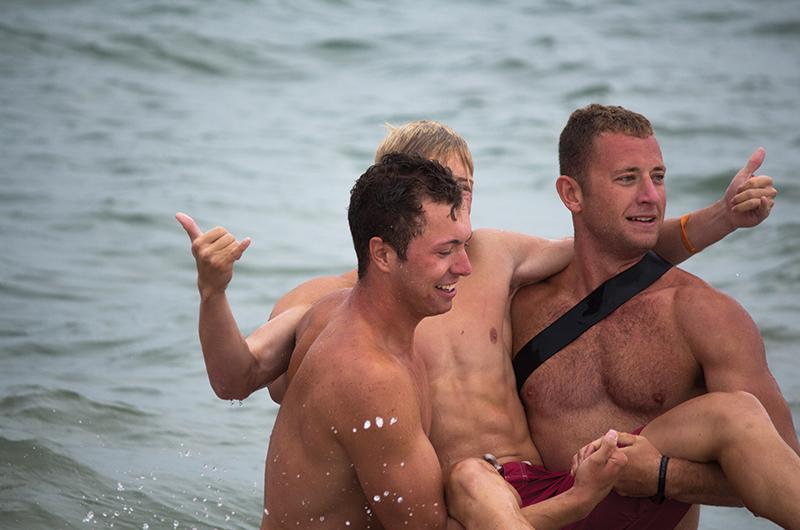
“This is a serious beach,” Jordan said. “It’s not The Inkwell, where you just sit there and watch kids all day. We actually have to go out there and make rescues.”
That’s why Jordan makes his lifeguards do the mile-long swim every morning. It’s why he’s militaristic about their timeliness. It’s why their training involves mock rescues in tidal waves, endurance tests, and suicide sprints. It’s why Jordan’s had more than a dozen saves over his six years as a guard. And it’s why, as far as he knows, they’ve never lost anyone.
“It’s all fun and games until that moment comes,” Jordan said. “But with all the training I make my guards do, when that time comes, they do it well.”
Last year, Jordan, who’s a cadet at Norwich University and hopes to enter the Coast Guard when he graduates, had two tourists wearing jeans and T-shirts sucked out in a rip current, with one using the other as floatation. He had to tear them apart before they were ushered to shore, one of them unconscious.
“We thought we were going to lose her,” Jordan said. “But she came to.”
He’s had missing kids and panicked parents, missing phones and panicked kids. He’s part archaeologist, part osteologist, a connoisseur of fractures, “spinals,” dislocations, and mis-locations. He’s been part of heart-thumping ATV reconnaissance missions to the adjacent lifeguard-free drive-on beach Norton Point, or as the lifeguards call it, the “Wild West.”
“When it hits the fan, it hits,” said lifeguard Kate Hansen.
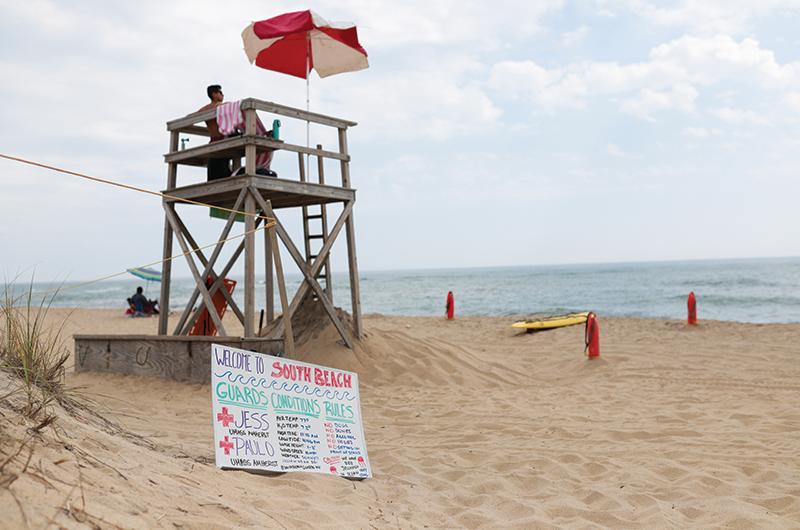
A twenty-one-year-old from West Tisbury, Hansen had to act quickly one day when waves got so large that they almost washed away one of the guard stands. Others have had to save more than stands on choppy days.
“I was on stand five and there were some wicked big waves,” said Austin Reid, a twenty-year-old student from Roger Williams University who has since traded in his trunks for the chance to train as a firefighter. “This kid got rocked. I mean, like, really bad.”
Reid was remembering a time when six-foot waves knocked a surfer off his board, breaking his leash and dragging him out to sea. Reid had to swim out nearly 100 yards, bringing the surfer – and his board – back to shore.
“That was a pretty spooky one,” he said.
The lifeguards have discovered 300-pound dead seals that were probably 400 pounds when they were alive. The only thing scarier than their smell was probably the thought that a bigger marine animal caused it.
They’ve sent out choppers looking for sharks and spouses, only to discover them an hour later, happily feasting on the beach. The spouses, that is. Not the sharks.
“Even on the calmest days, crazy stuff can happen,” Hansen said. “Stupid stuff too.”
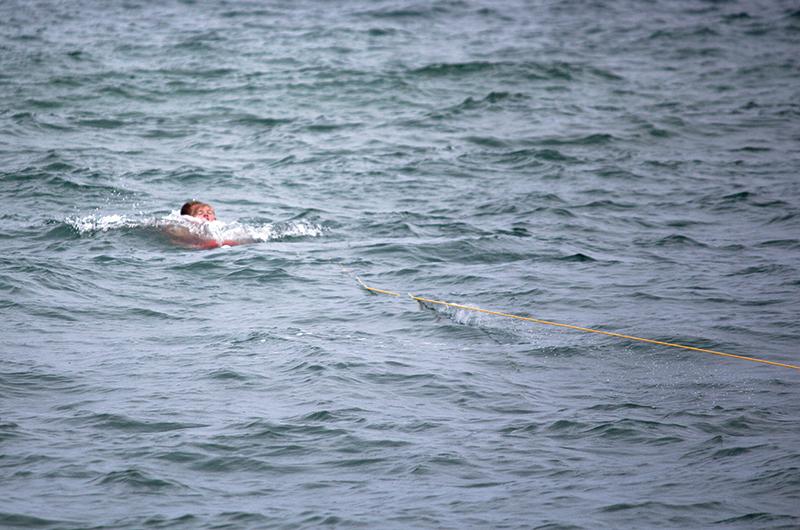
It’s the stupid stuff that keeps the lifeguards busy.
“I’ve had people throw beers as far as they could in the water and try to chase them,” Jordan said. “We had a case where we had a girl sort of passed out drunk behind the garbage can, and her friend is coming to get her, but we’re like, ‘All right, grab your stuff, time to go, you’re done for the day and off the beach.’ And they start bolting, thinking they are getting arrested, running down the beach, full-on sprint.
“We had an old lady scream, ‘We’ve got runners!’” Jordan said. The police were on the scene in seconds. “That was funny, chaotic stuff. And they did go to jail for that.”
When the police aren’t readily available, the lifeguards turn to the park patrolmen, a beloved crew of about a dozen salt-crusted ex-cops, coaches, and carpenters who keep an eye on the beach, picking up trash and handing out silver badges to super-swimmer seven-year-olds. Jordan still has his from when he was a kid, glistening on the mantle at his mom’s house.
“It’s the highlight of their day,” he said of the childhood accolades. “I know. It was the highlight of mine.”
The park patrolmen like to have their fun with the lifeguards too. A seeming eternity of experience has made them masters of summer prankery, especially when the lifeguards are off the clock.
“I’m a big fan of the air horn,” said second-generation patrolman Dan Townes. “We have one guy who will nod off at lunch time and he always needed someone to wake him up. We’re good at that.”
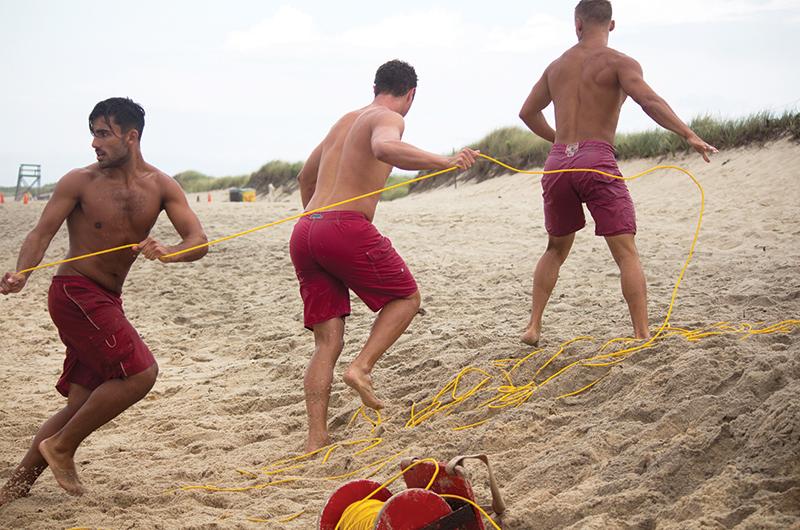
The second-best pranksters on the beach are the lifeguards themselves. It can be a lonely eight hours on the stand.
“It’s always fun and games up there for them,” Jordan said. “They like to lube up the stand with sunscreen. They like to play mind games on the younger guards. They think it’s hilarious. But Saturdays and Sundays, when the beach is packed and it’s like Where’s Waldo out there, they are honestly on their game.”
Their “game” means looking out for everyone. Literally, everyone.
“We may have rescued one of our own lifeguards,” said Jordan, a Hasselhoffian twinkle in his eye. “But, you know, it happens to everyone. We’ve had guards freak out on the radio thinking driftwood is a person. But...it’s not.”
That vigilance, that dedication to professionalism and the craft, has endeared the crew to the South Beach regulars.
“We have this old lady that’s come in the last couple years, and she gives the lifeguards a bag full of candy and jokes,” Jordan said. “It’s awesome. A different joke every day. And getting those jokes makes their day.”
That lady is Alaya Chadwick, and the jokes – generally of the kind one might find on the back of a Laffy Taffy – pale in comparison to the lifeguards’ unabashed commitment to laughing at them. They like knowing that someone still thinks they’re kids. They like knowing that someone else still appreciates them for being kids.
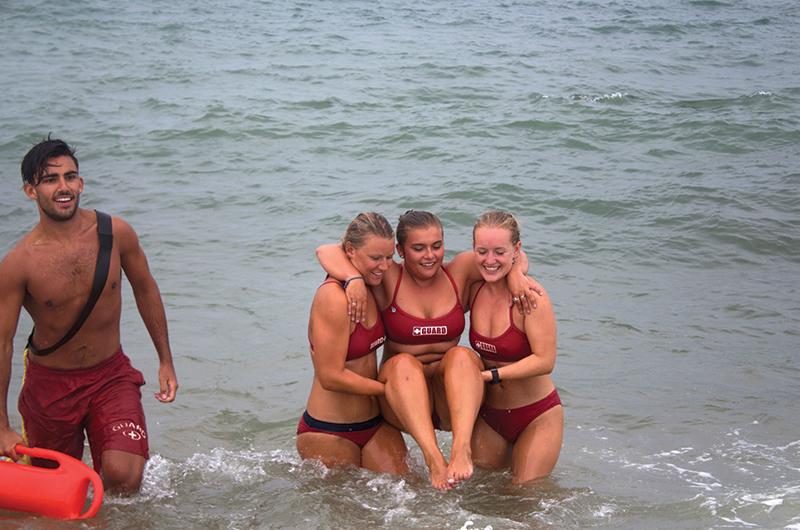
“She’s seen those kids progressing, getting better,” Jordan said. “She’s seen the kids grow up.”
Nobody has grown up more than Jordan. He started on the job as a sixteen-year-old with a mop of flowing blonde locks and a Baywatch dream. Now he runs the beach, the crew
leader with the crew cut, teaching his guards how to dig people out of six foot holes, perform rescues 1,000 feet out into the water, and become one with the “can” – the lifeguards’ term for their flotation device. Jordan believes in building up his guards. If they’re not strong swimmers, they spend more time in the water. If they aren’t in shape, they spend more time running. He remembers being sixteen. He knows how far he’s come.
“We’re the best of the best,” he said. “That’s who we are.”
By twenty-one, most lifeguards are starting to look for summer internships, ready to graduate from the beach to the boardroom, from sand castles to ivory towers. Jordan doesn’t care. He’s already got a job.
“I’m going to come back until they tell me I can’t,” he said. “I love this place.”

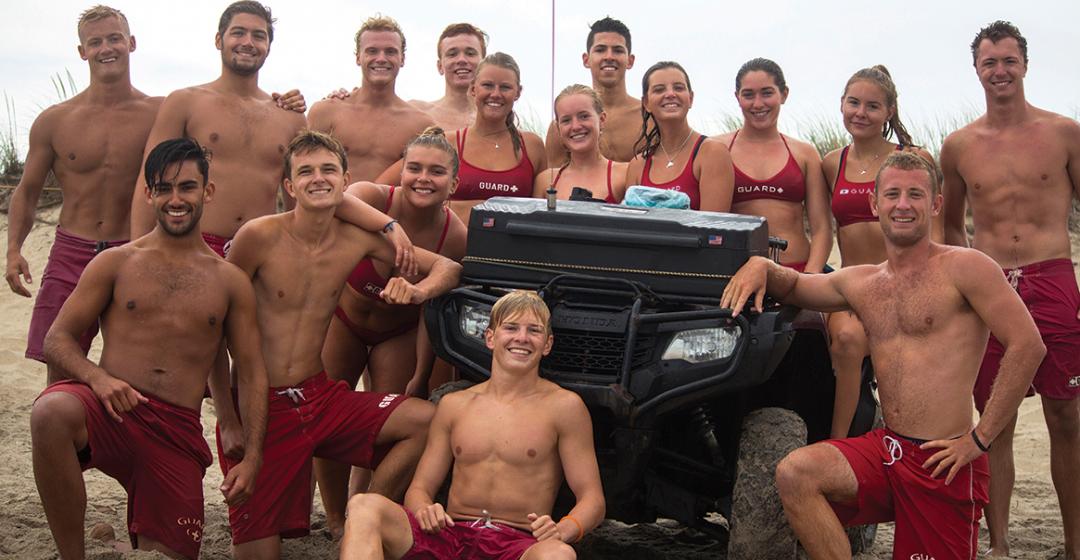


 1 comment
1 comment
Comments (1)